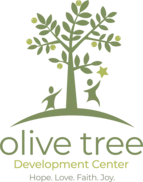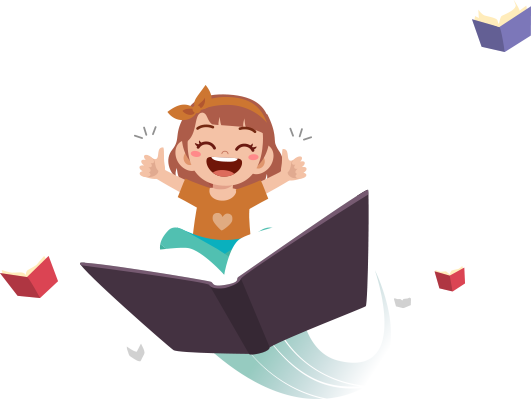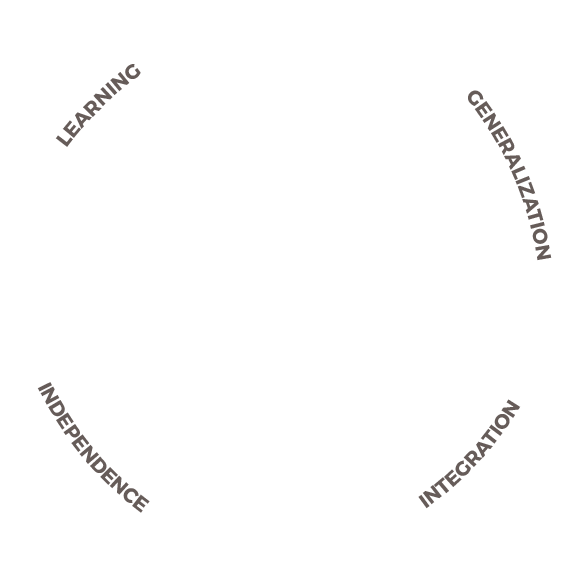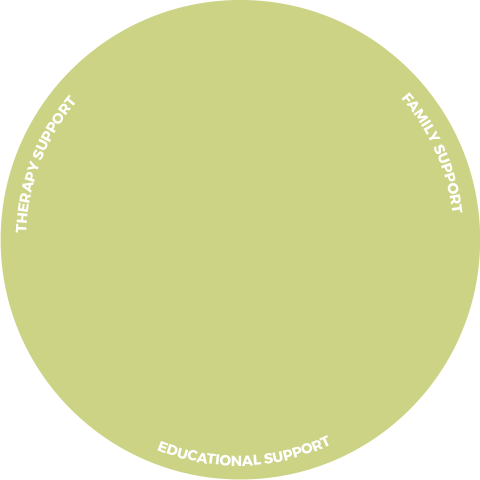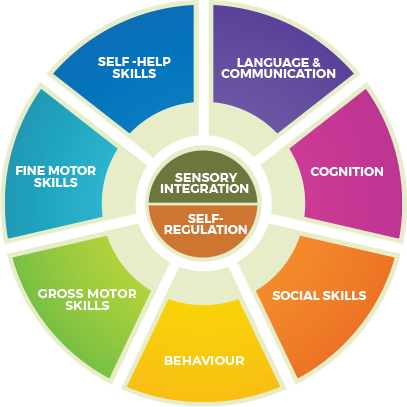The Olive Tree Early Intervention Programme focuses on the Seven Developmental Areas of Learning:
The Olive Tree Early Intervention Programme
A STRUCTURED AND INDIVIDUALISED PROGRAMME FOR CHILDREN TO STIMULATE AND ENHANCE THEIR HOLISTIC DEVELOPMENT
The Olive Tree Early Intervention Programme is an integrative approach towards learning for all developmental differences. We provide small group early interventions with a teacher-child ratio of 2:5 at maximum. This allows for more intensive support while continuing to promote social interactions and peer learning. We have developed our proven integrative curriculum based on research and the expertise of our clinical and educational professionals.
What is Early Intervention?
How Can Our Early Intervention Programme Help Your Child?
Eligibility for Early Intervention Programme
Choosing the Right Early Intervention Programme
Our Curriculum Framework
The Olive Tree Early Intervention Programme focuses on building your child’s core skills from the ground up. These include sensory-motor and language skills, adaptive behaviour, socio-emotional development, and other concept learning. By setting a strong foundation in these areas, your child will gain the necessary skills for them to explore and learn from their peers and environment.
Each component of our curriculum is meticulously planned by our team of special education teachers, psychologists, occupational therapists, speech-language therapists, and educational therapists. Quality standards in our curriculum are assured through yearly audits.

Behaviour
A child should be able to hold himself in any circumstance he is placed in. We encourage regulation of the self, being able to adapt to a situation, focus on tasks, manage impulses and cope with challenges appropriately.

Social Skills
We prioritize your child’s ability to create social relationships. We encourage social skills like turn-taking, theory of mind, group dynamics, and understanding nonverbal cues.

Cognition
We maximise a child's ability to take in the world. We enrich cognitive skills such as literacy and numeracy, problem solving, memory, planning and organization. We do this by incorporating both play and exploration in our lessons, building engaged learners.

Language and Communication
A child who understands and is understood is confident, resilient and proactive. With the guidance of our Speech Therapists, we build on your child's receptive language, expressive communication, articulation and speech clarity. We aim to raise effective communicators of all needs and abilities.

Gross Motor Skills
Gross motor skills refer to big muscle movements such as running, jumping and climbing. These movements require strength, balance and coordination. They are needed for both daily life and play, and serve as a foundation for fine motor skills.

Fine Motor Skills
Fine motor skills refer to smaller, more coordinated muscle movements, mostly involving the hands and fingers. Tasks that require efficient fine motor skills include threading beads, twisting knobs and holding a crayon.

Self-Help Skills
Everyone must learn to care for themselves and for their immediate environment. We teach essential daily skills such as feeding, dressing and toileting. We encourage practicipate in age-appropriate chores such as keeping one's things, setting one's place at the table, and keeping one's space neat and clean.
Our Intake Process
Multidisciplinary Screening
An initial screening session will be conducted by a team of specialists. Together, they will engage with your child in different ways, effectively observing skills from the Seven Developmental Domains of Learning and tracking baseline data.
Core Early Intervention Programmes
Based on the results of the screening, your child will then be recommended to one of the following levelled group classes:
-
Early Intervention Programme (EIP)
A programme designed to thoroughly stimulate and enhance holistic development processes in young children, helping them to acquire the fundamental skills needed in their early years and in preparation for formal learning. This programme includes Educational Therapy, Speech Therapy, and Occupational Therapy.
It is suitable for children with developmental delays in their motor skills, language and communication skills, social skills, or cognitive skills. The recommended programme duration is 9 - 12 hours a week for at least 6 months.
Designed for children with developmental ages 2-5 years, this class focuses on building the first adaptive skills necessary for learning and exploration.
-
School Readiness Programme (SRP)
A programme designed to build adaptive skills needed for learning and thriving in a school setting. With an individualised and multidisciplinary approach, SRP focuses on cognitive development, friendship development, cooperation, sharing, taking turns and sharpening academic skills in preparation for the transition to mainstream schooling. Such academic skills can include numeracy, literacy and knowledge of the world. This programme includes Educational Therapy, Speech Therapy, and Occupational Therapy.
It is suitable for preschool children with developmental gaps in their cognitive skills, social skills, language and communication skills, or motor skills. The recommended programme duration is 9 - 12 hours a week for at least 6 months.
Designed for children with developmental ages 5-7 years, this class focuses on building adaptive skills needed for learning and thriving in a preschool setting as well as for transitions.
-
School Bridging Programme (SBP)
SBP seeks to strengthen learning skills necessary for successful transition from early intervention to the school setting. This individualised approach is an outcome-oriented process that fully supports learning academically, socially and emotionally. There is also a distinct focus on social interactions and friendship development as the children begin their journey in the formal schooling system. This programme includes Educational Therapy, Speech Therapy, and Occupational Therapy.
It is suitable for children transitioning from preschool to primary school with developmental gaps mainly in their cognitive or social skills. The recommended programme duration is 3 hours a week for at least 6 months.
Designed for children with developmental ages 6-8 years, this class focuses on strengthening learning skills necessary for primary school.
-
Life Skills Programme (LSP)
Pre-vocational training/ Enhanced Life-Skills training aims to develop independence by learning essential life skills and functional communication skills within your child’s immediate environments.
This programme will also prepare your child to identify vocational preferences while gaining transitional skills for independent functioning in the outside world by matching your child’s specific skills and abilities to appropriate job or trade.
More specifically, this programme aims to develop skills such as following directions that include multiple steps, sustaining attention over longer periods, completing non-preferred work without complaining, and asking for help only when necessary.
Designed for children with developmental ages 8 years and above, this class focuses on strengthening learning skills necessary for independence and community integration.
Our Schedule
We have a daily 3-hour programme that is personalized to accommodate each child's needs and family schedule.
Weekday Schedule
- Morning session: 9-12 pm
- Afternoon session: 2-5 pm
Saturday Schedule
- Morning session: 9-12 pm
- Afternoon session: 1-4 pm
- 2-5 pm

How We Track Progress
We value our collaborations between families and teachers. For each term in the Olive Tree Early Intervention Programme, we will provide:
- An Individualised Education Plan (IEP) that will serve as benchmarks for your child's treatment and progress.
- Monthly Reports detailing both your child's specific learning experiences and strategies for the home front.
- Face-to-face Parent-Teacher Conferences (PTC) with the multidisciplinary team, during the middle and end of the year.
- Progress Reports during the middle and end of the year.
